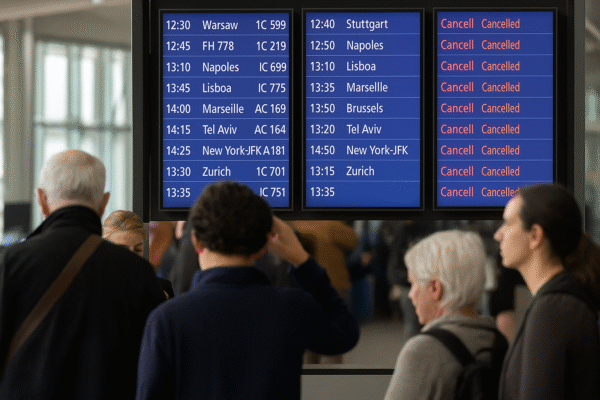Zurich, Switzerland & Mumbai, India – In a case that has shocked global travelers, a 44-year-old Indian businessman was convicted of sexually assaulting a 15-year-old girl on board Swiss International Air Lines flight LX155 from Mumbai to Zurich on 17 March 2024. The incident—and its legal aftermath—has become a focal point in international aviation safety discourse, highlighting evolving consent laws and in-flight safeguards.
Incident Overview & Judicial Outcome
According to the Zurich Public Prosecutor’s Office, the victim, seated beside the accused during the overnight flight, attempted to sleep following a brief exchange. The perpetrator then initiated non-consensual physical contact, which escalated to sexual assault. The distressed victim alerted cabin crew, who immediately isolated her and monitored the assailant until arrival. Swiss authorities arrested him upon landing.
Charged under Switzerland’s expanded sexual assault provisions—notably revised to embrace the principle ‘no means no’—the court found him guilty of rape and sexual acts with a minor. He received a suspended 18‑month prison sentence, a five-year ban from Switzerland, and a prohibition from working with minors. Despite the conviction, the light sentence sparked widespread debate over justice and aviation safety.
Swiss Consent Law Reform: A Legal Turning Point
Prior to the 2023 reform, Switzerland’s legal definition of rape demanded proof of force or coercion. However, new legislation expanded accountability to include any sexual penetration without consent, regardless of physical resistance. This case serves as a legal milestone—affirming that consent is fundamental, even under shock or incapacitation.
The reform places Switzerland among progressive jurisdictions championing broader protections against sexual violence, signaling to airlines and lawmakers that consent is non-negotiable.
Rising Threat of In-Flight Assaults Globally
In-flight sexual misconduct is gaining attention worldwide. The FBI reported a 65% increase in cases between 2014 and 2017, with 96 new investigations opened in 2023 alone. Many occur during overnight flights when passengers are most vulnerable.
A research review found that most victims are unaccompanied young females seated near window or middle seats, often under blankets when the incident occurs. Airlines and regulators are urged to enhance training and reporting procedures.
Best Practices & Safety Guide for Passengers
To protect themselves during flights, passengers are advised to:
- Stay alert. Report discomfort or suspicious behavior immediately to cabin crew.
- Choose safe seating. Seats near crew or in visible areas can deter potential offenders.
- Travel with companions. Being seated next to someone trusted can provide added protection.
- Act promptly. Report incidents as soon as possible—during flight or upon landing—for better evidence and response.
Airline Protocols and Policy Reforms
In Switzerland, the airline praised its crew’s “swift and appropriate” handling of the incident, reinforcing the importance of immediate crew response and procedural adherence.
Globally, regulatory bodies like the U.S. Department of Transportation have established task forces to study in-flight misconduct. In 2019, the In-Flight Sexual Misconduct Task Force recommended improvements in reporting, staff training, and data handling—especially to ensure incidents are felt ethically and legally.
Meanwhile, airlines such as Southwest and Alaska have updated in-flight safety announcements to include guidance on reporting sexual assault, reinforcing the importance of a supportive onboard environment.
In the U.S., the FAA has referred hundreds of unruly passenger cases—including assault—to the FBI, affirming aviation safety as an expanding legal concern.
Transforming Travel Safety: A Global Imperative
This Swiss case underscores the urgent need for:
- Enhanced training. Airlines must equip crew with sensitivity and legal-response skills.
- Robust reporting mechanisms. Built-in, discreet systems for passengers to report misconduct.
- Legal clarity. Harmonization of consent-based laws across countries to protect vulnerable travelers.
In-flight assaults diminish trust in air travel. Stronger protocols, shared data, and transparent policy enforcement can restore confidence.
At a Glance
| Feature | Insight |
|---|---|
| Case Details | 15-year-old victim assaulted on SWISS flight; business found guilty under ‘no means no’ law |
| Legal Reform Impact | First landmark usage of reformed Swiss legislation emphasizing consent |
| Global Relevance | FBI notes rising cases; in-flight assault protocols evolving in U.S. and Europe |
| Passenger Tips | Stay alert, sit with companions, report discomfort, understand rights |
| Industry Response | Enhanced crew training; task force recommendations shaping policy |
Final Thoughts
The assault aboard Swiss International Air Lines flight LX155 has become more than legal news—it’s a catalyst for global aviation reform. As countries like Switzerland redefine consent and airlines implement proactive measures, the travel industry must continue prioritizing the safety and dignity of all passengers.
Staying informed and empowered is key. If you’d like, I can provide a printable travel safety checklist or airline-specific reporting guidelines next.
For more travel news like this, keep reading Global Travel Wire
















